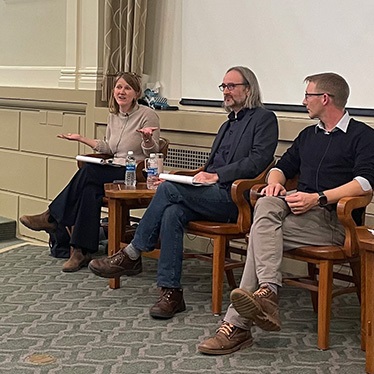The Old Rules No Longer Apply
June 20, 2007
How SU’s Institute for Security and Counterterrorism is partnering with one of the world’s most prestigious counterterrorism institutes to help understand and combat unprecedented threats.
Iraqi insurgent tactics, relying heavily on car bombings and other guerilla-style attacks, have become more and more sophisticated, with increasingly fatal results for Iraqi civilians and U.S. troops. Although U.S.-led forces enjoyed a swift overthrow of the government of Saddam Hussein in 2003, the ongoing occupation of Iraq has demonstrated that superior training, tactics, and technology are of less use when your opponent doesn’t play by the rules.
For more than 100 years, nations engaging in warfare have been guided by protocols—the so-called “laws of war.” Seeded at the first Geneva Convention of 1864 (with guidelines pertaining to the treatment of wounded soldiers on the battlefield) and augmented and formalized at a series of Hague and Geneva conventions since, these rules attempt to “diminish the severity and disasters of war” (as it was stated at the Hague in 1907). They set standards for acceptable combat, legal and illegal weaponry, the treatment of prisoners of war, the destruction of cultural property, the responsibilities of neutral countries, and a range of other issues inherent in warfare.
While the rules were not always followed, they provided a framework of acceptable action and response. They defined barbarism, and gave nations that abide by the rules rationale for a response when others resort to tactics considered outside the norms.
But in the last 20 years, the nature of warfare has changed, with conflicts between equally matched nations replaced by acts of terrorism from rogue extremist and insurgent groups. Think Iraq. Afghanistan. Osama bin Laden. In what’s become known as asymmetric warfare, non-state- or state-supported terrorists/insurgents disregard established protocols while using unconventional means to negate the strengths of typically more powerful adversaries.
“These conflicts have produced all kinds of disconnects with the way wars have traditionally been conducted and the rules for conducting those wars,” says William Banks, Laura J. and L. Douglas Meredith Professor of Law, professor of public administration, and an international expert on constitutional and security law.
According to Banks, terrorism often leaves the defending state with little choice but to respond in ways that inflict heavy civilian casualties. As a result, nations with the upper hand, expected to restrain themselves, are instead criticized for violating established rules (even when retaliating against opponents that violate the same rules). No one seems certain anymore what is acceptable.
Despite widespread international acknowledgment that the nature of warfare has changed dramatically in the last 20 years, there has been little systematic attention to revising laws of war that are as much as 100 years old. It’s time, Banks says, to re-examine those rules.
“There’s no accountability,” he concludes, “for those involved in these types of conflicts.”
Accountability. That’s what’s on the table.
In an SU College of Law conference room, Banks is debating dilemmas posed by the Israel- Hezbollah conflict last summer; also in the debate are colleagues from the International Bar Association in London and the International Policy Institute for Counter-Terrorism in Israel. It’s one of a series of video teleconferences bringing together experts in international law, security studies, and counterterrorism to examine the application of century-old rules of war to modern-day war.
Banks is acting in his role as director of Syracuse University’s Institute for National Security and Counterterrorism (INSCT), created in 2003 as a joint initiative of the SU College of Law and the Maxwell School. INSCT has an interdisciplinary focus, tackling law and policy questions related to security and counterterrorism. Faculty affiliates have expertise in military operations, global counterterrorism policy, counterproliferation, diplomacy and international relations, terrorist methods and psychology, history, law, and economics. They teach graduate students from a range of disciplines, many of whom are pursuing the University’s certificate in security and terrorism studies.
Today’s videoconference fits dead-center in INSCT’s purview. What makes it special, though, are the other players—particularly Boaz Ganor. Ganor is founder and director of the International Policy Institute for Counter-Terrorism (ICT) in Herzliya, Israel. ICT is a bit like INSCT, in that it is housed in a school of public affairs (the Lauder School of Government) that is part of a larger university (the Interdisciplinary Center). ICT has emerged as perhaps the leading academic think tank for counterterrorism in the world. It tries to facilitate international cooperation in the global struggle against terrorism, serving as a wellspring of expertise in homeland security, threat vulnerability, intelligence analysis, defense policy, and the like.
“Most of the world has learned about terrorism from the experiences of the Israelis,” says Banks. “It’s a laboratory that can’t be beat anywhere in the world for learning first-hand from those who’ve experienced terrorism how to counter it.”
In fall 2005, ICT and INSCT entered into a formal partnership, combining their complementary strengths. It was a natural fit—a renowned think tank, situated in one of the world’s terrorism hotspots, and a new, quickly emerging academic institute, overseen by a scholar recognized as an international authority on security law and policy. Together, ICT and INSCT now share a goal of educating a new generation of leaders to combat modern terrorism. The partnership brings together:
Ganor, who is also a member of Israel’s National Committee for Homeland Security Technologies and a consultant to Israeli Government Ministries on counterterrorism;
ICT deputy director Eitan Azanzi, a colonel in the Israeli Defense Forces; and at INSCT, experts such as Banks; retired U.S. General Montgomery Meigs (currently heading a Pentagon task force studying improvised explosive devices); William Smullen, director of Maxwell’s National Security Studies program and former chief of staff to Secretary of State Colin Powell; and Maxwell Dean Mitchel Wallerstein, a former deputy assistant secretary of defense for counterproliferation policy.
“It’s an incredible brain trust,” says Keli Perrin, assistant director of INSCT. “The sharing of ideas and cultivation of relationships between these pre-eminent experts and their powerhouse organizations makes them each more potent than they are on their own.”
The INSCT/ICT partnership was originally the brainchild of SU trustee Gerry Cramer, a Syracuse University alumnus and long-time champion of the Maxwell School—a member of the School’s advisory board who has funded more than three dozen student scholarships and four named professorships at Maxwell. Cramer is also a benefactor of the Interdisciplinary Center—the university of which ICT is part. Daphna Cramer, his wife, is an Israeli and the couple spends quite a bit of time at their home in Israel. His strong connections to both institutions made him a likely broker for this arrangement.
“The Lauder School at IDC was looking to pair with someone to develop its program in government and diplomacy,” Cramer says. “When you have a deep affection for two institutions, you try to find areas where they could be beneficial to one another. I knew the Maxwell School was a natural partner. And any time you create something new and outside the envelope, you create an avenue for great things to happen.”
At the heart of the INSCT/ICT partnership is a series of student exchanges, largely funded by Cramer. Both institutions have designed intensive two- and three-week courses exclusively for the students of their partnering institution, designed to give those students an overview of the pertinent issues. Syracuse sends students to ICT in Herzliya in the summer to learn about counterterrorism; IDC sends Israeli students to the Maxwell School in the fall to learn about American politics and governance.
“The best way for a student to learn is to be on the ground in a different area,” says Cramer. “For the Syracuse students, coming to Israel brings their schoolwork to life. For the Israeli students, coming to Maxwell provides a crash course in American public policy. They each leave with a better understanding of the respective countries that they couldn’t have gotten any other way.”
Just ask Jon Panikoff. He was one of the first eight graduate students from Syracuse to take part in the exchange, traveling to Israel at the end of May 2006 for an intensive course on counterterrorism at ICT. Three weeks after the SU students arrived, the Hezbollah kidnapping of an Israeli soldier occurred. Coincidentally, it was the first day of the student’s Terrorism and Extortion course, taught by Colonel Lior Lotan, also the chief negotiator for the Israeli Army.
“Talk about real-time learning,” says Panikoff, who is pursuing SU’s joint law/international relations degree.
Ten days later, with warfare between Israel and Hezbollah in southern Lebanon escalating, officials decided to abort the students’ visit to Herzliya. Most of the students returned to the United States, but Panikoff chose to stay and continue a research project he was doing about Hamas.
“For me, not to have stayed would have been a mistake,” he says of this opportunity. “I had to continuously edit every single day because of changes in the situation.”
This summer, 13 more Maxwell and law students will travel to Herzliya to take an intensive three-week counterterrorism course. Some will stay for an additional one-week course in Arab culture.
“I’ve always been fascinated by the Middle East,” says Essa Remoquillo, an M.P.A. student from the Philippines who will make the trip. “Studying security would not be complete without a well-informed perspective on the Arab-Israeli conflict and especially not without understanding terrorism.”
And, for the first time, undergraduate SU students have the opportunity to study at ICT through the SU Abroad program. Maxwell and ICT have designed an intensive two-week foreign study program on Israel and Middle East Policy at Herzliya. Twelve SU students are participating in the program this May.
“The vantage point of ICT in Israel at this point in time is unbeatable,” Panikoff says. “This partnership means there is going to be a new generation of Americans who understand what needs to be done to ensure that terrorism is rooted out throughout the Middle East.”
On the other side of the exchange, 15 outstanding government students from the Interdisciplinary Center (selected from a pool of 53) came to Maxwell last fall. They spent two weeks learning about the American political system and its history, U.S. foreign and defense policy, and conflict resolution. They also took study trips to Washington, where they visited various government institutions and research institutes, and New York, where they visited the United Nations.
Although undergraduates in Israel, the students were older than American undergraduates, having served their requisite Israeli military service before entering university, and as a result brought significant life understanding of security and terrorism issues.
“I know I value our way of life and the freedoms we enjoy more because of my military experience,” says Ben Gofman, a third-year law and government student who served in the paratroopers unit of the Israel Defense Forces. For that reason, he and most of his fellow students were interested in expanding their skills in diplomacy, foreign policy, and conflict resolution.
“We’re not interested in war anymore,” said third-year government student Ronna Shoham. “The young generation is open-minded to bringing about peace in the Middle East. No one wants to keep this conflict going. That’s why we’re here.”
All of the students say the primary value of the exchanges is to learn first-hand that both America and Israel are more than what is reported to outsiders through the media. “Israel is not all about war and conflict,” said Gofman. “We can be a channel for the American students to reflect the real Israel. Israel is a great country.”
“I deeply cherish the importance of liberty, this notion of ‘live free or die,’” said Shoham. “It’s exactly the opposite in Israel. We fight for our freedom every day.”
While the student exchange programs are now under way—and, in some sense, still at the heart of the ICT/INSCT partnership—the promise of faculty interaction is now becoming clear. It stems from the fact that the two partners are alike in their goals, but quite different in their histories and relative strengths.
INSCT and the Maxwell School will tap into the unique operational and deterrence experience of ICT’s faculty practitioners. “The combination of American-Israeli knowledge and experience, via the schools and institutes will, I believe, greatly assist in training decision makers and American practitioners to better cope with terrorism and homeland security,” says ICT’s Boaz Ganor.
ICT, on the other hand, will draw from Maxwell’s traditions in public affairs education—particularly its experience developing and implementing highly successful graduate and executive education programs.
“The Maxwell School is a role model for all the schools of government worldwide,” says Ganor. “The Lauder School for Government at IDC is one of the best schools in Israel, but is only seven years old.” Ganor says that ICT will look to Maxwell for guidance in the development of government, social science, and public administration programs.
INSCT and ICT are working now to develop a regular series of faculty exchanges. And, once IDC receives government approval to offer graduate degrees, Maxwell and the Lauder School hope to offer a formal joint graduate program with students dividing their time between the two institutions.
In the meantime, there is Banks’s “laws of war” project. INSCT and ICT have assembled a team of experts, collaborating on how the laws should be re-shaped to account for asymmetric warfare. Experts represent the International Bar Association, the Canadian Parliament, Israeli Defense Forces, the U.S. military, and various academic institutions from around the world.
The research will reach a major milestone this October, with a conference in Washington, timed to coincide with the 100-year anniversary of the adoption of the Hague Rules of 1907. The event, titled “New Battlefields, Old Laws: From the Hague Conventions to Asymmetrical Warfare,” will include a panel of well-placed, well-known policy experts, and will serve to bring this challenge to the fore. It’s a necessary first step toward a conversation that could have worldwide impact for years. The ultimate goal, probably many years off, would be the adoption of new international pacts on the laws of war.
This summer, the experts working on the laws-of-war project will meet in Herzliya, where they’ll work through case studies related to the Israel/Hezbollah conflict; studies of U.S. experiences in Afghanistan and Iraq; and consideration of other conflicts, such as in West Africa and the Balkans. Their recommendations will be at the core of the October conference.
“We’re out to create a set of new understandings, which could provide accountability for those who are engaged in these kinds of conflicts,” says Banks. “Not from the point of view of the United States or of Israel, but for all groups and nations that have a stake in warfare.”
By Renee Gearhart Levy
Related News
School News

Apr 2, 2025
School News

Mar 26, 2025
School News

Mar 24, 2025
School News

Mar 18, 2025

